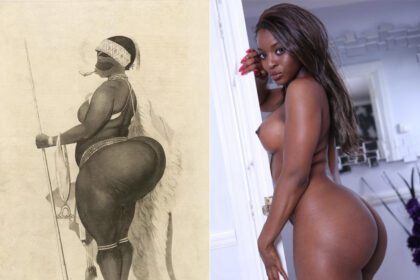Argentina is often seen internationally as a largely white Latin American country — a perception grounded not only in demography, but in decades of national narratives that invisibilized its African roots. Today, Black women in Argentina remain a small but powerfully symbolic presence. Their visibility — often confined to hypersexualized or marginalized spaces — raises uncomfortable but necessary questions about history, representation, migration, and the lingering effects of erasure.
This article explores why there are so few Black people in Argentina today, how Black women navigate a landscape shaped by whiteness and exoticization, and why some end up in industries like adult entertainment or working as escorts in Argentina, but due to structural forces far beyond individual choice.
A Brief History of Black Presence in Argentina
Contrary to popular belief, Argentina had a significant Afro-descendant population during colonial and early republican periods. In cities like Buenos Aires and Córdoba, Black people once made up 30% to 50% of the population in the 18th and early 19th centuries. These were largely descendants of enslaved Africans brought during the transatlantic slave trade under Spanish rule.
Black Argentines fought in the country’s wars of independence and made substantial cultural and economic contributions. Yet by the end of the 19th century, their numbers had drastically declined — a shift often misrepresented as natural disappearance.
The Myth of Disappearance
There is no single reason for the decline in the visibility of Afro-Argentines — but several key events contributed:
- Wars and Disease: Many Afro-Argentines were conscripted disproportionately into wars (like the Paraguayan War) where mortality was high. Epidemics like yellow fever also disproportionately affected Black communities due to poor housing and limited access to healthcare.
- Miscegenation and Whitening Policies: Through interracial marriage and state policies promoting European immigration, the idea of a “white Argentina” was systematically cultivated. Census practices often reclassified mixed-race people as white, further erasing Black identity.
- Cultural Erasure: The rise of tango, the suppression of African religions, and the Eurocentric education system gradually removed Afro-Argentine culture from the mainstream.
Today, less than 1% of Argentina’s population self-identifies as Afro-descendant — but the real number may be higher, obscured by decades of assimilation and social pressure to conform to whiteness.
Modern Black Presence: Migrants and Margins
The small Black population visible in modern Argentina is largely composed of migrants from:
- West Africa (e.g., Senegal, Nigeria)
- The Caribbean (e.g., Dominican Republic, Haiti)
- South America (e.g., Brazil)
Most of these migrants arrive seeking work, education, or refuge from economic hardship. However, without strong institutional support or networks, many find themselves at the margins of society — working as street vendors, undocumented laborers, or, in some cases, sex workers.
Representation and Visibility: The Case of Black Women
Black women in Argentina face multiple layers of invisibility and hypervisibility:
- Invisibility in politics, media, and mainstream culture — there are virtually no prominent Black Argentine actresses, journalists, or public figures.
- Hypervisibility in exoticized and fetishized contexts — especially in nightlife, modeling, and adult content.
This contradiction — being both unseen and overexposed — reflects a long history of how Black female bodies have been sexualized and commodified under colonial and postcolonial systems.
In Buenos Aires, for instance, some Black women — particularly from the Caribbean or West Africa — report being approached for sex work regardless of their profession, a clear sign of racial profiling and sexualized assumptions.
Why Some Black Women End Up in the Adult Industry
It’s important not to generalize — most Black women in Argentina are not involved in the adult industry. But among those who are, several structural and social factors explain the pattern:
1. Economic Necessity
Migrants often face language barriers, documentation issues, and racial discrimination, which limit access to stable employment. Without formal support systems, some turn to adult work — often the only option that pays relatively well without requiring legal status.
2. Hypersexualization and Demand
There is an undeniable fetish market for Black women globally — and Argentina is no exception. In a society where Blackness is rare, the eroticization of the “exotic other” creates demand. Unfortunately, this demand is often met with supply from vulnerable women, not empowered ones.
3. Systemic Racism
Argentine society — while warm and welcoming on the surface — often upholds Eurocentric beauty standards and subtle racial hierarchies. Black women are rarely hired in public-facing roles unless tied to hypersexualized imagery (like dancing, “cultural” shows, or escort services).
Challenging the Narrative
Organizations like Diafar (African Diaspora of Argentina) and Identidad Marrón (focused on racialized Argentines) have worked tirelessly to highlight Afro-Argentine presence and fight racism. These groups:
- Offer workshops in schools
- Hold cultural festivals celebrating African heritage
- Push for inclusion in media and government policy
In 2010, for the first time in over a century, Argentina’s national census included a question about African ancestry. This was a step toward recognizing the erased contributions of Afro-Argentines — and challenging the myth of homogeneity.
Moving Forward: Representation with Dignity
The presence of Black women in Argentina — whether in academia, street commerce, or adult work — is not just about race. It’s about visibility, dignity, and agency.
We need to move beyond simplistic narratives like “scarcity makes them more attractive” or “they’re naturally sexual” — which echo colonial tropes. Instead, we must:
- Acknowledge historical erasure
- Create space for positive representation
- Provide support to Black migrants and Afro-descendants
- Challenge the systems that push women into precarious labor
Conclusion
Black women in Argentina are few, but they are not voiceless — and their experiences tell a deeper story about the country’s past and present. Scarcity is not just a matter of numbers, but of deliberate invisibilization. And attraction, when rooted in exoticism or inequality, reveals more about the viewer than the viewed.
As Argentina continues to reckon with its identity, it must also face its ghosts — and among those are the forgotten daughters of Africa who helped build the nation, and who still live within it, waiting to be truly seen.









